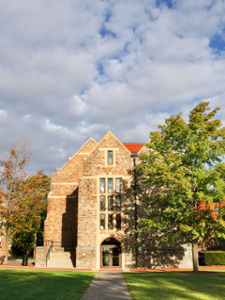
German Studies
The goal of Hamilton's German Studies Department is to examine from an interdisciplinary perspective the language, literature, culture, historical development and politics of German-speaking countries.
About the Major
Germany’s important contemporary position, cultural legacy, and turbulent history at the center of European affairs make it an important topic of study for a wide range of interests: language and literature, government and diplomacy, international trade, science and technology. German is one of the major official languages of the European Union and is recognized as an important language of business, particularly in Eastern Europe. At Hamilton, German studies majors work closely with professors in small classes and spend at least one semester studying in Germany.
A Sampling of Courses

First-Term German
Introduction to the German language. Exercises in aural comprehension, speaking, reading and writing reinforced by short cultural and literary texts. No previous knowledge of German required.
Explore these select courses:
Investigates how the Bauhaus school revolutionized modern art and design. From its founding in 1919 to its closure by the Nazis, the course examines how artists and architects reimagined art in an industrial world to shape a new, modern way of life. Students explore how Bauhaus design embodied a vision of a utopian future birthed by art, craft, and design—and the darker realities and contradictions that accompanied this ambition—within the social and political context of twentieth-century Germany.
Meet Our Faculty
social and economic history of the early Middle Ages; history of law and mechanisms of conflict resolution; the perceptions of non-Christian peoples and lands in medieval manuscript culture
International political economy, European politics, U.S. foreign policy
Twentieth and twenty-first century Germanic literatures, cinema studies, media theory, narratives of migration, translation studies
19th and 20th century German literature and culture, history of craft and technology, theory of the novel, material culture, gender and sexuality
Modern and Postmodern Jewish, Israeli, European, and American prose fiction, drama, and contemporary literary theory
Careers After Hamilton
Hamilton graduates who concentrated in German studies are pursuing careers in a variety of fields, including:
- William H. Laird Professor of German, Carleton College
- Webmaster, IBM Corp.
- Vice President, Deutsche Bank Americas
- Senior Vice President, Coca-Cola Company
- President, World Emergency Relief
- Head of Languages, St. Paul's School
- General Counsel, Westdeutsche Landesbank Girozentrale
- Director, International Technology Office, U.S. Environmental Protection Agency
- Director, Copyright, Public Broadcasting Service
- Designer, EuroEast Tours
- Bureau Chief, Financial Times
Explore Hamilton Stories

Griffiss Institute Releases Findings From Levitt Center Student Economic Research
This summer, Levitt Center student researchers Luke Hanson ’26, Delaney Patterson ’26, Samuel Low ’28, and Ton Somnug ’27 joined forces with Griffiss Institute CEO and Hamilton alumna Heather Hage ’02 to investigate the holistic impact of federal spending on the local economy. In November, the Griffiss Institute released findings from the research study.
Contact
Department Name
German Studies Program
Contact Name
John Eldevik, Program Director
Clinton, NY 13323








